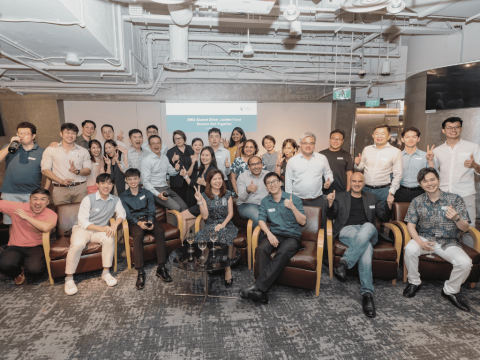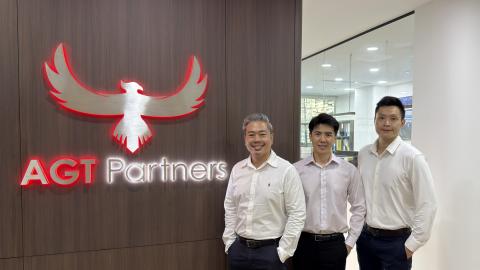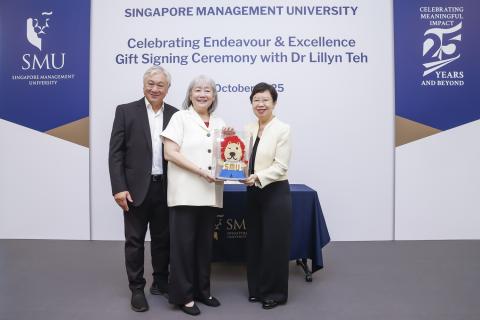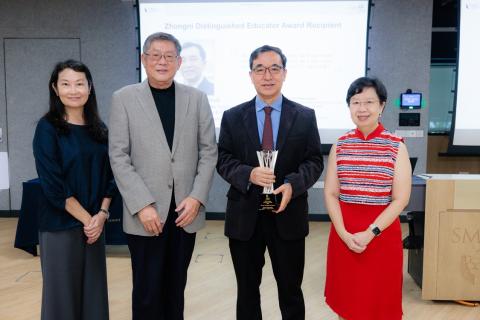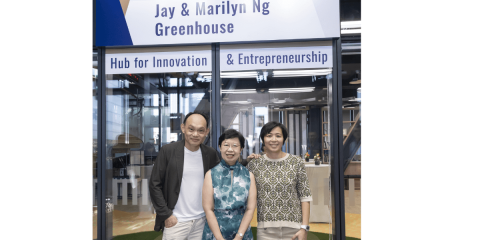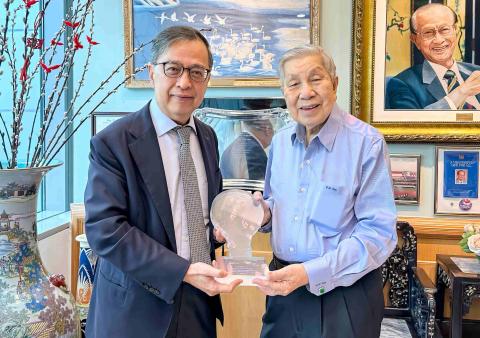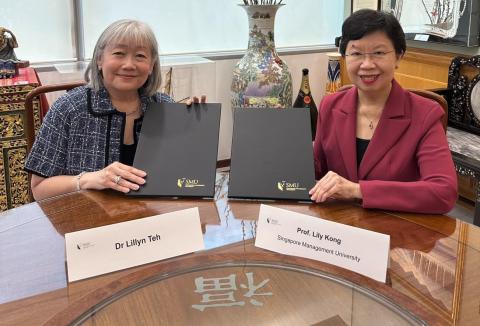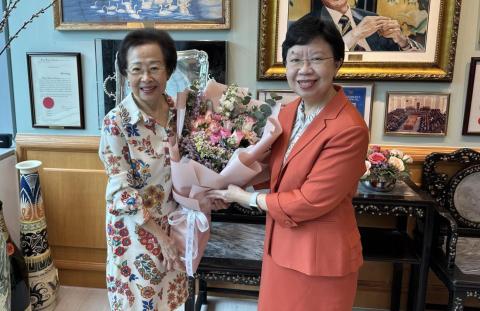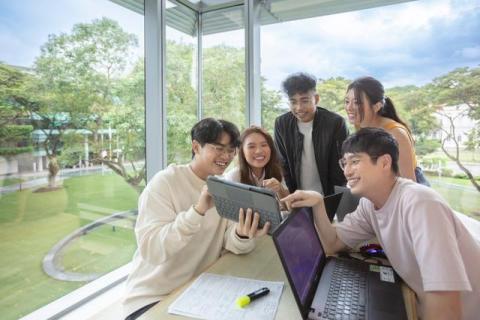Riding the next wave of globalisation
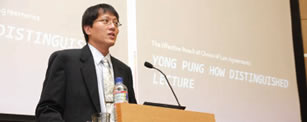
Over 250 people attended the lecture by Dr Victor Fung, Group Chairman of Fung Group, on “The Next Wave of Globalisation: Opportunities and Challenges for Tomorrow’s Leaders” held in conjunction with the 8th Fung Scholars Leadership Conference 2015 on 9 October 2015.
Among the audience were SMU Chairman Mr Ho Kwon Ping, Directors and President of the Victor and William Fung Foundation, SMU President Professor Arnoud De Meyer, Fung Scholars and Fung Fellows, as well as the SMU Community.
Traditionally held in various cities of China and USA, this is the first time the Conference was held in Singapore, and also a first for SMU.
In his Welcome Remarks, Professor De Meyer said that Dr Victor Fung “was a founding member of the first Board of Trustees in SMU. He was a member of the pioneering team which steered the course of SMU in our early years to be a university which made the difference to Singapore’s tertiary education landscape. We have benefited from his wise counsel and guidance, as well as his strong commitment to SMU’s growth and development.
“Dr Fung was our Guest-of-Honour and keynote speaker at the SMU Convocation in 2003 when we welcomed our 4th cohort of freshmen. In 2006, he established the Fung Scholars programme at SMU for outstanding full-time local undergraduates at SMU to go to overseas universities for exchange. To date, 160 SMU students have benefitted from this programme which helped them gain exposure to different cultures and environments.”
Among the professional and civic appointments which Dr Fung holds, he is a member of the Economic Development Commission of the Hong Kong Government, a member of the Chinese People’s Political Consultative Conference in China, and an economic advisor to the People’s Government of Nanjing. Internationally, Dr Fung played a leadership role from 2007 in the Paris-based International Chamber of Commerce, of which he was Chairman from 2008 to 2010. From 2012 to 2013, he was a member of the World Trade Organisation’s Panel On Defining The Future of Trade.
[Caption: More than 250 people, including SMU Chairman Mr Ho Kwon Ping, Directors and President of the Victor and William Fung Foundation, SMU President Professor Arnoud De Meyer, Fung Scholars and Fung Fellows, as well as the SMU Community, attended the lecture by Dr Victor Fung.]
In his lecture, Dr Fung identified two major trends that are reshaping the global economy: the globalisation of consumption, and China’s vision and commitment to build the 21st Century Silk Road, which will have a profound impact on the multilateral system of the world.
Dr Fung noted that over the last 30-35 years, 1.5 billion new workers from Asia and other third world countries joined the global workforce, which brought about an era of globalisation of production, where different ways were developed to produce and manufacture. That was the era when firms looked at global supply chains and radical outsourcing. The result was developing economies could specialise in niche areas and join the global economy, bringing along millions of SMEs into the fold.
However, while production was globalised, global consumption – as much as 84% - was concentrated in OECD countries, led by Europe and USA. “If you were a global businessman looking at this period of globalisation of production but very localised consumption, the world was relatively simple, as all your customers were in US and Europe. You were sourcing from the east and selling to the west…..that was the way the world worked for 30 years,” he said.
Looking forward into next 30 years, Dr Fung said that consumption is now migrating from OECD countries to the developing countries. “The latest figure shows consumption in OECD has dropped from 84% to about 70%; by mid-century, about half of global consumption will be outside OECD countries. What’s driving this consumption is the rise of 3.5 billion new middle-class consumers in the developing economies of India, China, ASEAN, East Africa, Middle East, Latin America, etc.”
Turning to the second major trend, Dr Fung opined that China’s 21st Century Silk Road initiative, or One Belt One Road, “promises to be a significant driver not just about the next era of economic development in China, but also has tremendous regional and global economic significance. It will transform China’s relation with Europe, and the vast tracks of land and sea in between.”
The 'One Belt', or ‘Silk Road Economic Belt’, includes countries situated on the original Silk Road through Central Asia, West Asia, the Middle East, and Europe. The initiative calls for the integration of the region into a cohesive economic area through building infrastructure, increasing cultural exchanges, and broadening trade. ‘One Road’, or ‘Maritime Silk Road’, is a complementary initiative aimed at fostering collaboration in Southeast Asia, Oceania, and North Africa, through several contiguous bodies of water – namely the South China Sea, Malacca Straits, and Indian Ocean.
Dr Fung posited that the overland Silk Road Economic Belt accounts for a quarter of the 21st Century Silk Road economic weight, bringing energy and commodities into China. The Maritime Silk Road, on the other hand, accounts for 75% of the 21st Century Silk Road economic weight, covering 80% of the new non-OECD consumption in the world. “If you are able to develop the infrastructure, trading agreements and mechanisms, you would have captured the essence of the future growth of consumption in non-OECD countries over the next generation. That is the significance of why this Silk Road concept, if it does take hold, is going to be a very important linkage to that new consumption,” declared Dr Fung.
To successfully ride these two major trends, Dr Fung argued that businesses will have to get to know who the new non-OECD consumers are, understand what they want to buy, and develop new business models that will allow these companies to serve the millions of small-and-medium sized enterprises selling to tens of millions of consumers.
[Caption: SMU President Professor Arnoud De Meyer (right) moderated the Q&A session with Dr Fung.]
[Caption: Many interesting questions were posed by an enthusiastic audience during the Q&A session.]
In a lively Question & Answer session moderated by SMU President Professor Arnoud De Meyer, Dr Fung fielded numerous questions from an enthusiastic audience, including the competition and interdependence of USA and China, why the Silk Road project will succeed, incentives to encourage countries to adopt the Maritime Silk Road, as well as the opportunities and challenges which the Trans Pacific Pact presents China.
[Caption: (L-R) Dr Gigi Au Yeung, Dato’ Seri Douglas Foo, Mr Cheung Ho Yeung and Ms Denise Lim shared their entrepreneurship journeys at a session facilitated by SMU Professor Annie Koh (centre).]
[Caption: SMU graduate Denise Lim started three businesses in Guatemala.]
Following the lecture, an Entrepreneurship Seminar was held in the evening where several outstanding individuals shared their entrepreneurship journeys. They included Ms Denise Lim, a SMU graduate who started three businesses in Guatemala; Dato’ Seri Douglas Foo, Founder and Executive Chairman of Sakae Holdings Limited which has over 200 outlets globally; Mr Cheung Ho Yeung, Founder of Beyond Consulting, a student-led consulting firm that match undergraduates with companies for consulting projects; and Dr Gigi Au Yeung, Founder of DunDum, an environmental-social-technological enterprise that aims to directly reduce households' waste at source. The session was facilitated by Professor Annie Koh, SMU Vice President of Business Development.
[Featured photo: Dr Victor Fung spoke on the opportunities and challenges presented by the next wave of globalisation at the 8th Fung Scholars Leadership Conference 2015.]
